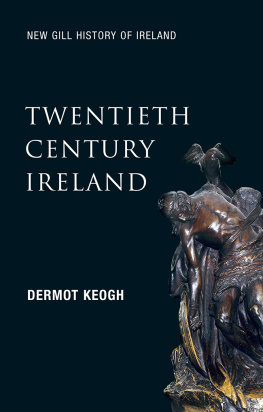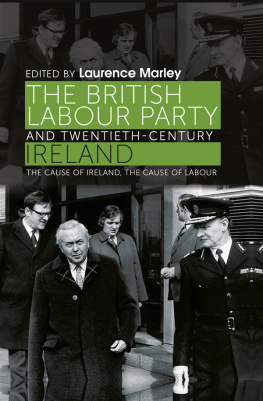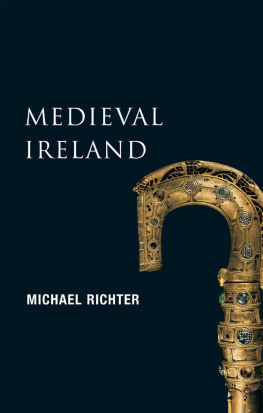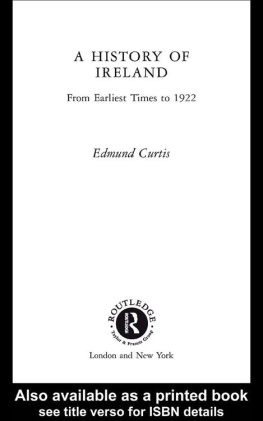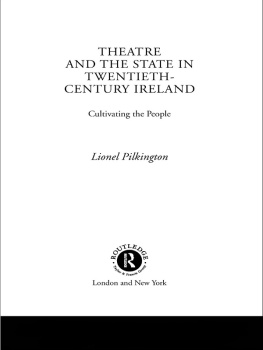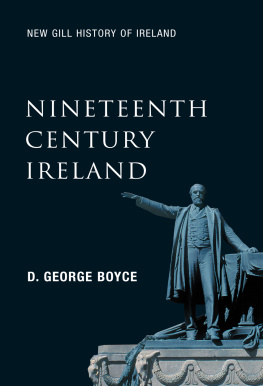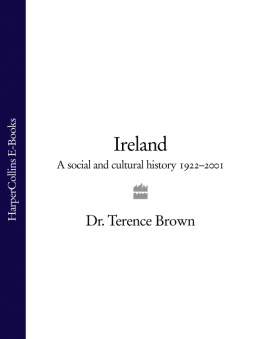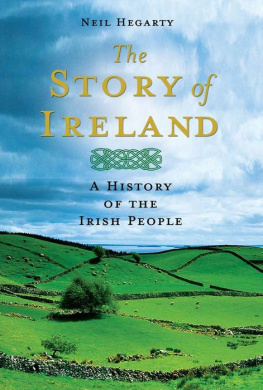Dermot Keogh - Twentieth-Century Ireland: Revolution and State Building (New Gill History of Ireland)
Here you can read online Dermot Keogh - Twentieth-Century Ireland: Revolution and State Building (New Gill History of Ireland) full text of the book (entire story) in english for free. Download pdf and epub, get meaning, cover and reviews about this ebook. publisher: Gill & Macmillan, genre: Politics. Description of the work, (preface) as well as reviews are available. Best literature library LitArk.com created for fans of good reading and offers a wide selection of genres:
Romance novel
Science fiction
Adventure
Detective
Science
History
Home and family
Prose
Art
Politics
Computer
Non-fiction
Religion
Business
Children
Humor
Choose a favorite category and find really read worthwhile books. Enjoy immersion in the world of imagination, feel the emotions of the characters or learn something new for yourself, make an fascinating discovery.
- Book:Twentieth-Century Ireland: Revolution and State Building (New Gill History of Ireland)
- Author:
- Publisher:Gill & Macmillan
- Genre:
- Rating:3 / 5
- Favourites:Add to favourites
- Your mark:
- 60
- 1
- 2
- 3
- 4
- 5
Twentieth-Century Ireland: Revolution and State Building (New Gill History of Ireland): summary, description and annotation
We offer to read an annotation, description, summary or preface (depends on what the author of the book "Twentieth-Century Ireland: Revolution and State Building (New Gill History of Ireland)" wrote himself). If you haven't found the necessary information about the book — write in the comments, we will try to find it.
Dermot Keogh: author's other books
Who wrote Twentieth-Century Ireland: Revolution and State Building (New Gill History of Ireland)? Find out the surname, the name of the author of the book and a list of all author's works by series.
Twentieth-Century Ireland: Revolution and State Building (New Gill History of Ireland) — read online for free the complete book (whole text) full work
Below is the text of the book, divided by pages. System saving the place of the last page read, allows you to conveniently read the book "Twentieth-Century Ireland: Revolution and State Building (New Gill History of Ireland)" online for free, without having to search again every time where you left off. Put a bookmark, and you can go to the page where you finished reading at any time.
Font size:
Interval:
Bookmark:

New Gill History of Ireland
Twentieth-Century
Ireland
Revolution and State Building
REVISED EDITION
Dermot Keogh
with Andrew McCarthy
Gill & Macmillan
For my mother, Maureen Keogh, for Ann, Aoife and Clare, Eoin and Niall, and for Edward and Angela Cahill
Preface
This book has been researched over six years in Ireland, in a number of European countries and in the United States. I have accumulated many debts of gratitude to people who helped me with their scholarship and friendship during this period of investigation. A number of institutions, at home and abroad, provided financial support which allowed me to research extensively in the United States. The head of the Department of History at University College Cork, Joseph Lee, has proved ever helpful over the past twenty years. His major work, Ireland 19121985: Politics and Society, was a source of great stimulation. The friendship of Joe and Anne Lee has meant much to myself and my family.
I was given study leave by President Michael Mortell and the Governing Body of UCC, while the Arts Faculty fund enabled me to research specific aspects of this volume. The Registrar of UCC, Aidan Moran, was always very supportive. Among my departmental colleagues I thank Elizabeth Steiner Scott and Brian Girvin. I am also grateful to many colleagues in Ireland and abroad who helped me with the writing of this work. In particular, I would like to thank Professors Brian Farrell, Tom Garvin and Ronan Fanning of University College Dublin. My thanks also to Deirdre McMahon and Neil Buttimer. Professor Patrick Lynch and Tom Barrington made an important contribution to my knowledge through their writings and advice. The late Professor T. Desmond Williams was an excellent teacher and a friend whose intellectual generosity was much appreciated.
I owe a deep debt of gratitude to Dr Mary Harris, Senior Lecturer, Department of Irish Studies, University of North London, particularly for her scholarly advice on the issue of Northern Ireland and for her expertise in the researching and drafting of the section on the Boundary Commission. She also made many valuable suggestions as a reader of the various drafts of this book and helped with sources in Irish.
My close friends, Matthew and Madelaine MacNamara, were supportive, and their home was a welcoming port during the manysqualls of university life which are designed to throw the working academic off course. Professor MacNamara translated a number of French sources and introduced me to many new ideas and approaches. Father Kevin Kennedys wide knowledge and culture was always a source of great stimulation. Bill and Miriam Hederman OBriens friendship and encouragement over many years should not go unrecorded. Brian and Laura Lennon are close friends who have been very helpful to me on many occasions, as were Angela and Edward Cahill. My former Irish Press colleague, Michael Mills, was very encouraging and often pointed me in the right direction. Liam Moher commented on the first draft of this book and suggested many changes. His late father, John, who was a Fianna Fil TD for Cork in the 1950s, helped me greatly to understand the political personalities and the events of those earlier years. My thanks also to Sen Dunne, who guided me towards a number of important sources and was ever willing to discuss my developing ideas and theories. John Banville, a friend from our time in the Irish Press in the early 1970s, helped with his advice and by providing me with a plentiful supply of Irish history books to review. The annual Patrick MacGill summer school was a source of great personal stimulation and Dr Malachy McCloskey and the committee were very hospitable to my family on our annual visits to Glenties. My thanks also to Annie and Joe Mulholland. Terence Brown of Trinity College Dublin was also very helpful and supportive.
The staff of the UCC library made the life of the researcher much easier. I am indebted to Tom Crawshaw, Edward Fahey, Helen Davis, Trudy Ahern, Ann Collins, Jill Lucey, Valerie Fletcher and Virginia Teehan. Richard Haslam, head of the Department of Public Administration at UCC, was an excellent guide to the labyrinthine world of local government in Ireland. My thanks also to Ruth McDonnell, UCC Information Officer, who helped me on many occasions. I also thank the staff of the Cork County and City libraries.
Dr Garret FitzGerald was very helpful to me over two decades of research, as was his colleague Peter Barry, who arranged for me to see certain files at the Department of Foreign Affairs. Brian Lenihan gave me a number of interviews. Many members and former members of the staff of the Department of Foreign Affairs were very helpful over the years. I am grateful, in particular, to Noel Dorr, Ted Barrington, Pdraic MacKernan, Thelma Doran, Billy Hawkes, Philip McDonagh, Bernadette Chambers and Declan Kelleher. Mire Mhac an tSaoi and Conor Cruise OBrien, former Irish diplomats, were generous withtheir time. Richard Stokes, Department of the Taoiseach, championed the opening of state archives when it was neither fashionable nor profitable. I am grateful to him for his persistence and professionalism. Dr David Craig, Ken Hannigan and Aideen Ireland of the Irish National Archives have all played an important role in facilitating the speedy processing and opening of official archives. I thank them for their assistance during my many long visits. The paper keepers in the National Archives provided a speedy and expert service which made working in Bishop Street a genuine pleasurefire alarms notwithstanding.
I also wish to thank the staff of the government departments who answered my many queries. Commandant Peter Young, Director, Irish Military Archives, and his staff helped locate relevant material. I am grateful to the staffs of the Archives Department, UCD, the National Library and Trinity College Dublin. Denise Moran and Mary Guckian of the library of the Institute of Public Administration, Dublin, were very helpful. I am also grateful to the staff of the British, French, Swiss, Italian, Dutch and German embassies for their help in the preparation of this manuscript. My particular thanks to the Spanish Ambassador, Fermn Zelada.
The later Cardinal Toms Fiaich gave me access to the Armagh archives and arranged for me to work in the archives of the Irish College, Rome. I am also grateful to Bishop Michael Murphy of Cork for access to the Daniel Cohalan papers. I am grateful to David Sheehy, Dublin Archdiocesan Archives. The Dominicans Austin Flannery and Bernard Tracey were generous with their time and help. The Jesuits gave me access to the Edward Cahill papers. The Franciscans made available a section of the amon de Valera papers on the framing of the 1937 constitution; I am particularly grateful to the archivist of that important holding, Dr Breandn Mac Giolla Choille. Brother Paul, the former editor of The Word, was very helpful in recalling his many contacts and interviews with leading Irish politicians and ecclesiastical figures. Father Gearid Silleabhin CM advised and read parts of this manuscript. Father Thomas Davitt CM very kindly let me read his fathers memoirs. On the question of church-state relations, I am indebted to Peter Hebblethwaite, Louis McRedmond, Sen MacReamoinn and Father Michael OCarroll. The Conference of Major Religious Superiors helped my research on certain aspects of this book. My thanks also to John Cooney. Tony OMalley gave me an extended interview; my thanks also to JaneOMalley, who received Ann and myself very warmly in their home in Callan, Co. Kilkenny. My thanks to Barbara Dawson and Liz Foster of the Municipal Gallery of Modern Art in Dublin. Charles Clarke gave me a number of important references to articles on twentieth-century Irish painting. My thanks also to Tim Pat Coogan and Martin Mansergh.
Font size:
Interval:
Bookmark:
Similar books «Twentieth-Century Ireland: Revolution and State Building (New Gill History of Ireland)»
Look at similar books to Twentieth-Century Ireland: Revolution and State Building (New Gill History of Ireland). We have selected literature similar in name and meaning in the hope of providing readers with more options to find new, interesting, not yet read works.
Discussion, reviews of the book Twentieth-Century Ireland: Revolution and State Building (New Gill History of Ireland) and just readers' own opinions. Leave your comments, write what you think about the work, its meaning or the main characters. Specify what exactly you liked and what you didn't like, and why you think so.

